Energized by expected windfalls from state and federal climate bills, Silicon Valley's elected leaders, industry experts and activists sounded a hopeful note Saturday, Nov. 12, as they vowed to accelerate their green initiatives.
While it's not yet clear when and how most of this money will be distributed, local environmentalists are expecting a boost from the federal Inflation Reduction Act (IRA), which allocates $369 billion for clean energy and decarbonization. This includes $14,000 rebates for consumers who buy heat pumps or other energy efficient home appliances, $7,500 in tax credits for newly purchased electric vehicles (and $4,000 for used electric vehicles) and funding to support 950 million solar panels, 120,000 wind turbines and 2,300 grid-scale batter plants, according to the White House.
The bill also includes $7 billion in grants to build 500,000 charging stations for electric vehicles across the nation, Dr. Ali Nouri, U.S. assistant secretary of energy, told the roughly 200 people assembled at Gunn High School's Titan Gym. The goal is to create a charging station every 50 miles to combat range anxiety among drivers. Nouri also said the package includes $12 billion to make the electric grid more resilient and $10 billion for carbon capture.
Just two weeks ago, the government distributed $3 billion in grants to 20 companies to build a supply chain for batteries, Nouri said.
"We are in an inflection point in that we really do have an historic opportunity here to not only address the environmental crisis that we're in but an opportunity to really also use it to create jobs and build manufacturing facilities and revitalize our communities, quite frankly across the country, that have been hallowed out from jobs and factories leaving," Nouri said.
The federal investment is supplemented by an inflow of state dollars. California cities and companies are banking of $54 billion in funding for climate change that the Legislature and Gov. Gavin Newsom approved in the last legislative session, a package that includes $6.1 billion for electric vehicles, $8.1 billion to support energy reliability and $13.8 billion for clean public transportation.
Palo Alto Mayor Pat Burt cited the recently approved state package and noted at the Saturday summit that this is more than most nations spend on climate change.
"This is a tremendous investment," Burt said. "It's enabling us to do what we need to do."
State Sen. Josh Becker, whose package of climate change bills include legislation that requires all state agencies to come up with plan to reduce greenhouse gas emissions by 2035, said the political climate has shifted in the Legislature when it comes to investing in clean energy. Just two years ago, a proposal to set a goal of carbon neutrality by 2045 received just 14 votes in the 40-member state Senate. The proposal, known as Senate Bill 1203, passed overwhelmingly in the last legislative session, with 31 votes of support.
Becker lauded recent efforts by cities like Palo Alto and Menlo Park to discourage gas appliances and encourage electrification. Menlo Park this year approved a partnership with the technology company BlocPower to electrify thousands of homes. Palo Alto, meanwhile, just launched a pilot program to convert 1,000 homes from gas heaters to heat pump water heaters in the next year.
A key goal, Becker said, is to make sure everyone can afford to participate in the switch to clean energy. He lauded recent moves by cities to update their building codes and impose requirements for electric vehicle charging stations at multifamily buildings.
"We have to find a way for everyone to benefit. That's why I'm really hopeful in working with our federal partners and the tremendous effort made to pass IRA on the federal level that we can now work tighter to build charge infrastructure that works for everyone, wherever they are," Becker said.
One program that aims to address equity is an effort in Menlo Park to install free solar panels at homes owned by low-income residents. Diane Bailey, executive director of the nonprofit Menlo Spark, said the program launched in 2016 as a partnership between her organization, Meta (then known as Facebook) and the city had initially applied to the historically underserved Belle Haven neighborhood. Since then, it was expanded to East Palo Alto. So far, about 100 homes have been retrofitted.
"It isn't enough but it is a start and it also invites lower income household to be part of the clean energy revolution, which is important," Bailey said during her presentation.
Becker and Nouri both lauded the recent local efforts by local cities to address climate change. Becker said these programs create models that he and other state lawmakers can cite as evidence for statewide programs. Nouri noted that they allowed the U.S. to remain "in the fight" against climate change even at times when there was little or no federal leadership in this area.
"And I'm here today and proud to say you have a partner today. You have a real federal partner to help you not just achieve the goals that you've been talking about but even extend and strengthen them," Nouri said.
The event, which was organized by the city and the student group Palo Alto Student Climate Coalition, featured presentations, a panel discussion and breakout sessions led by city officials and environmental leaders. Katie Rueff, a Gunn High senior and member of PASCC, said in an interview that the goal was to "bring together people from all different sectors, of different governments and different backgrounds, like NGOs, in order to facilitate discussions that aren't normally formed." That's also why the event had breakout sessions, where people could mingle and exchange ideas.
"Just to drive different solutions and see how different practices and innovations can be implemented immediately," Rueff said.
Vicki Veenker, who was just elected to the City Council, helped by inviting some speakers, including Nouri and John Hamilton, mayor of Bloomington, Indiana, who is in Palo Alto this week as part of a "sibling city" partnership that Veenker helped foster.
While much of the discussion at the panel concerned local and state efforts, Michael Wara, policy director at the Stanford University Doerr School of Sustainability, said a critical task in the years ahead will be developing ways in which less affluent societies in places like China and India can participate in the transformation. The strategy he outlined consisted of two steps: clean up the electric grid by replacing coal plants with renewable sources like solar and wind and then "electrify everything."
"Of course, there's going to be bumps," Wara said. "We're transforming the fundamental basis of modern technological society — that's what we're doing. But we're doing it."
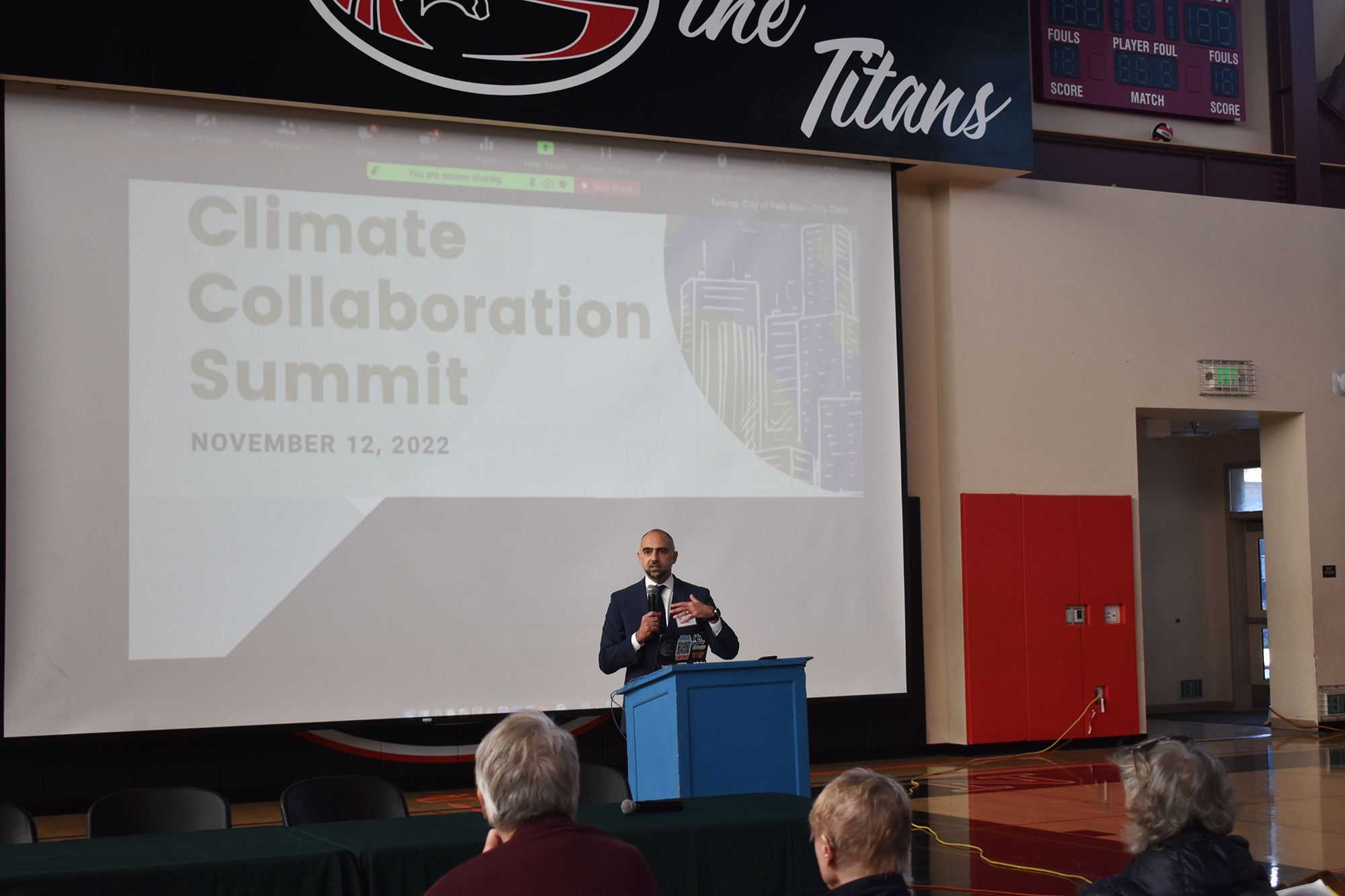
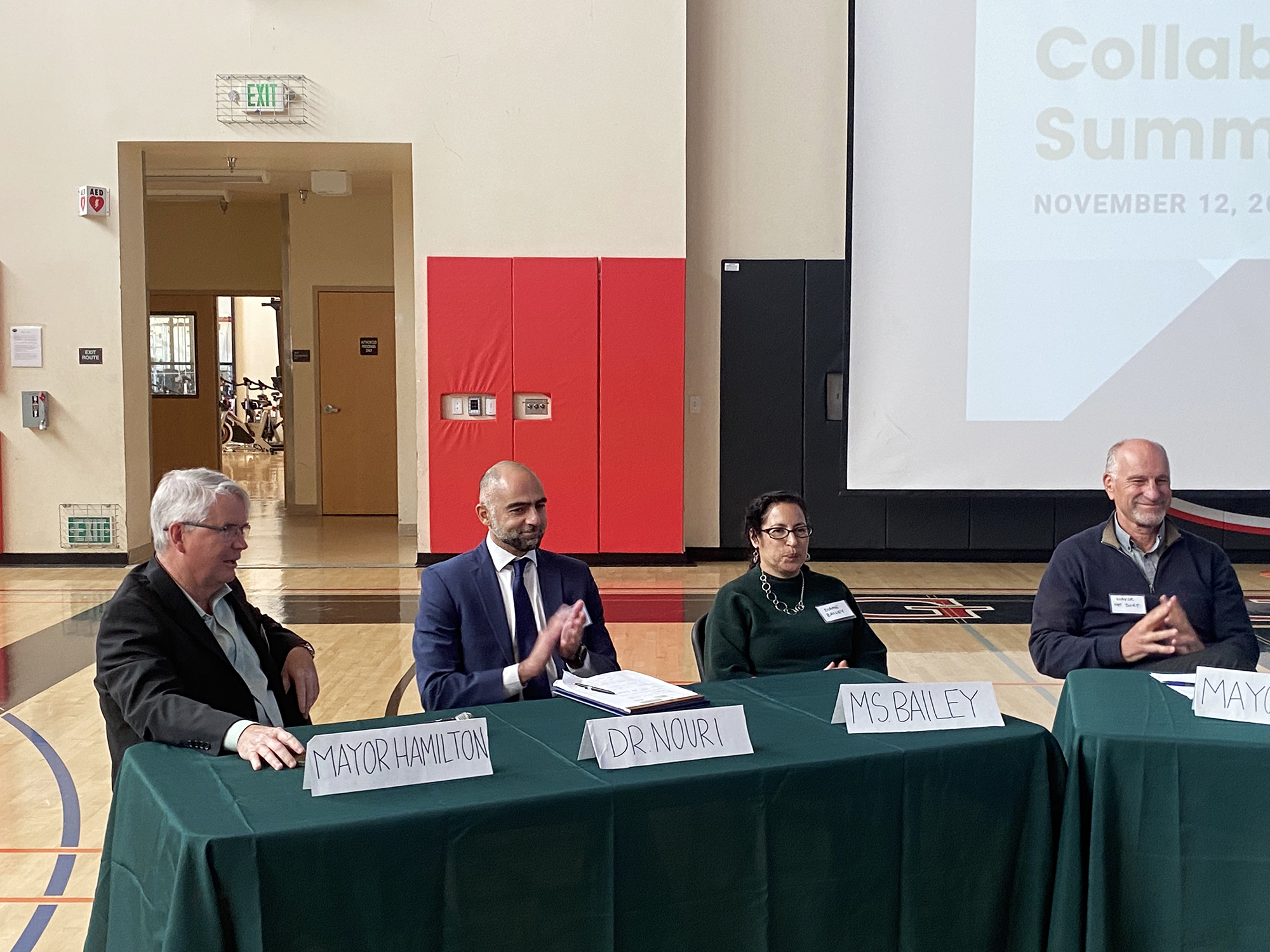
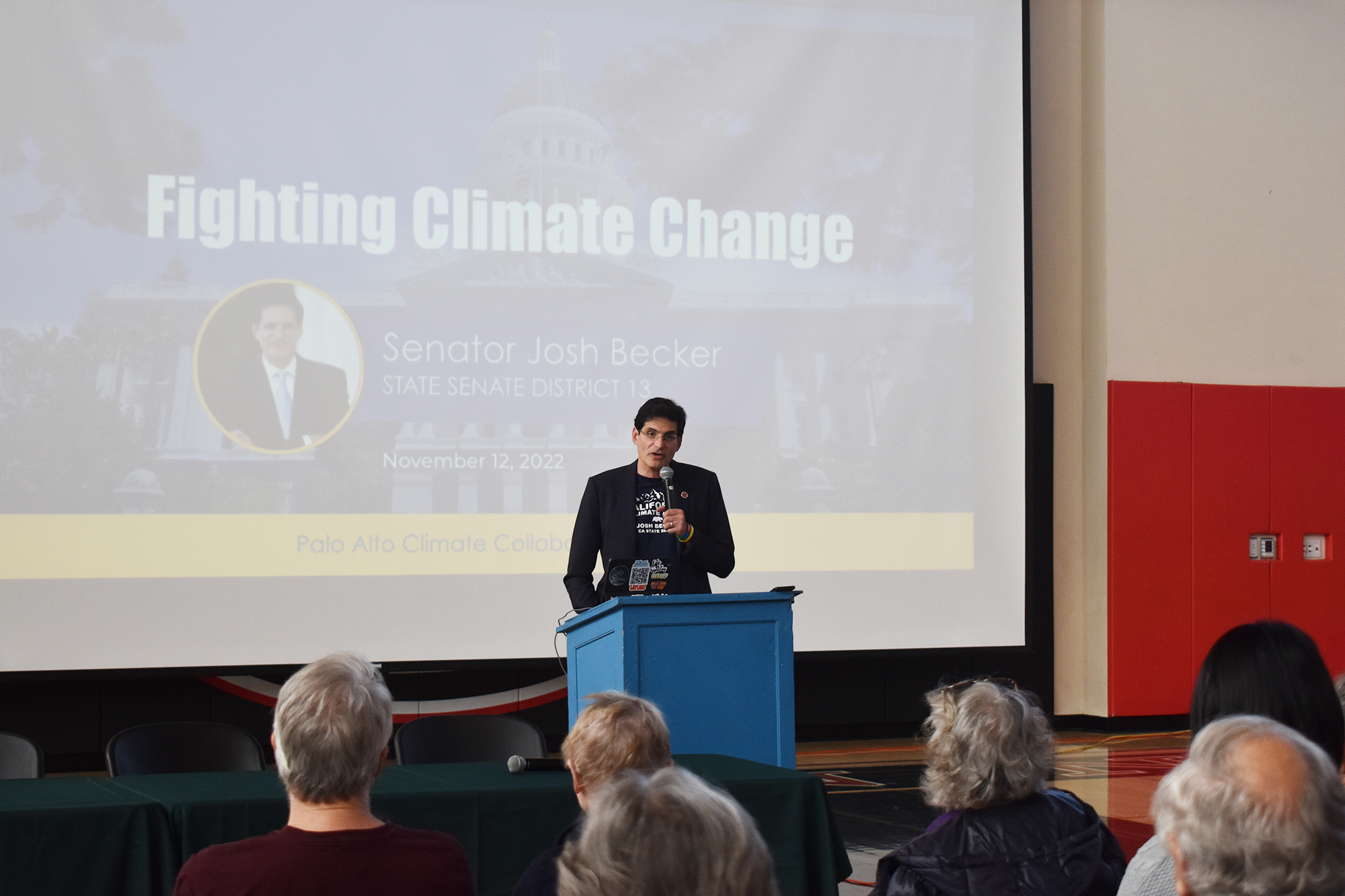

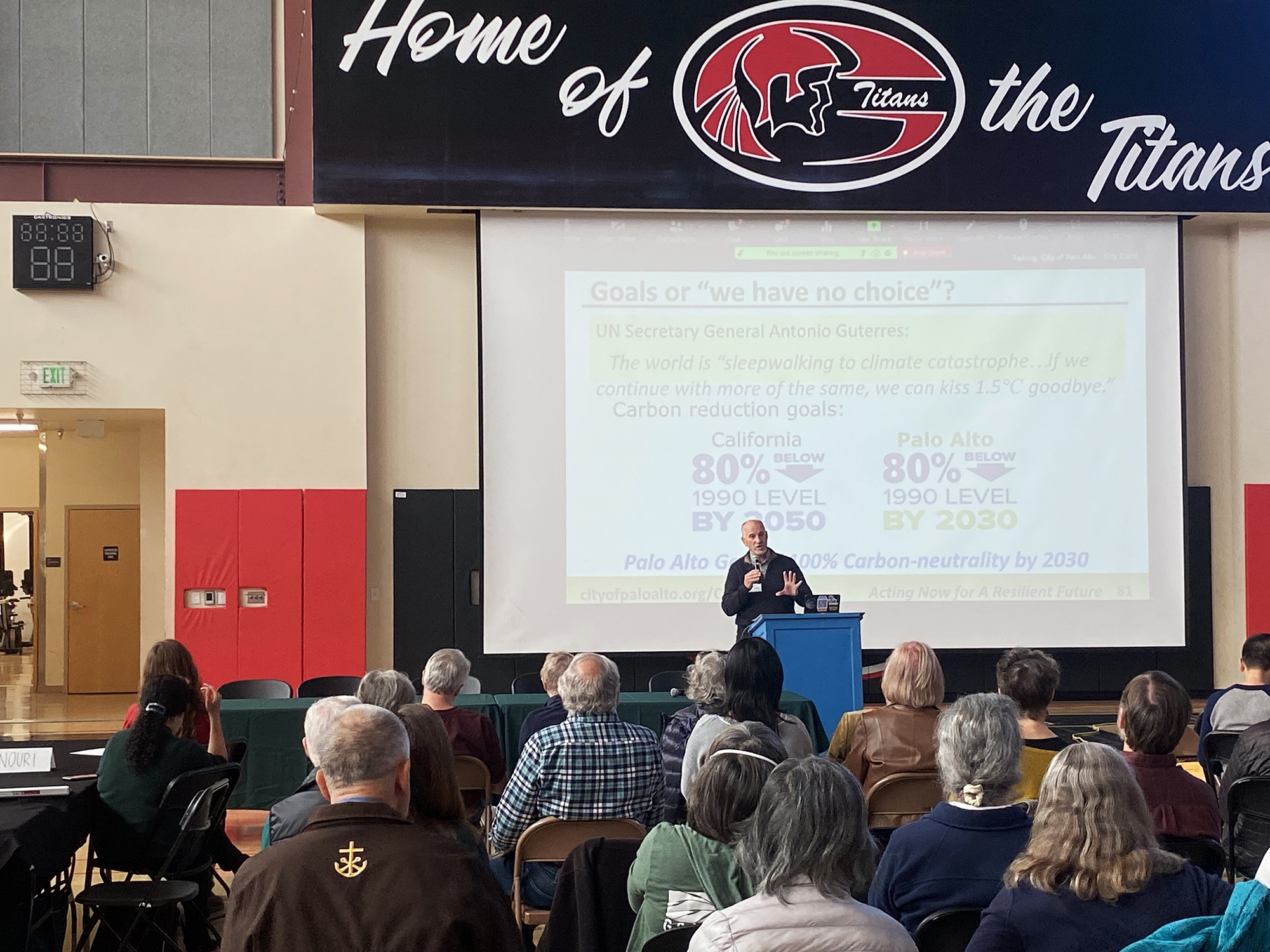
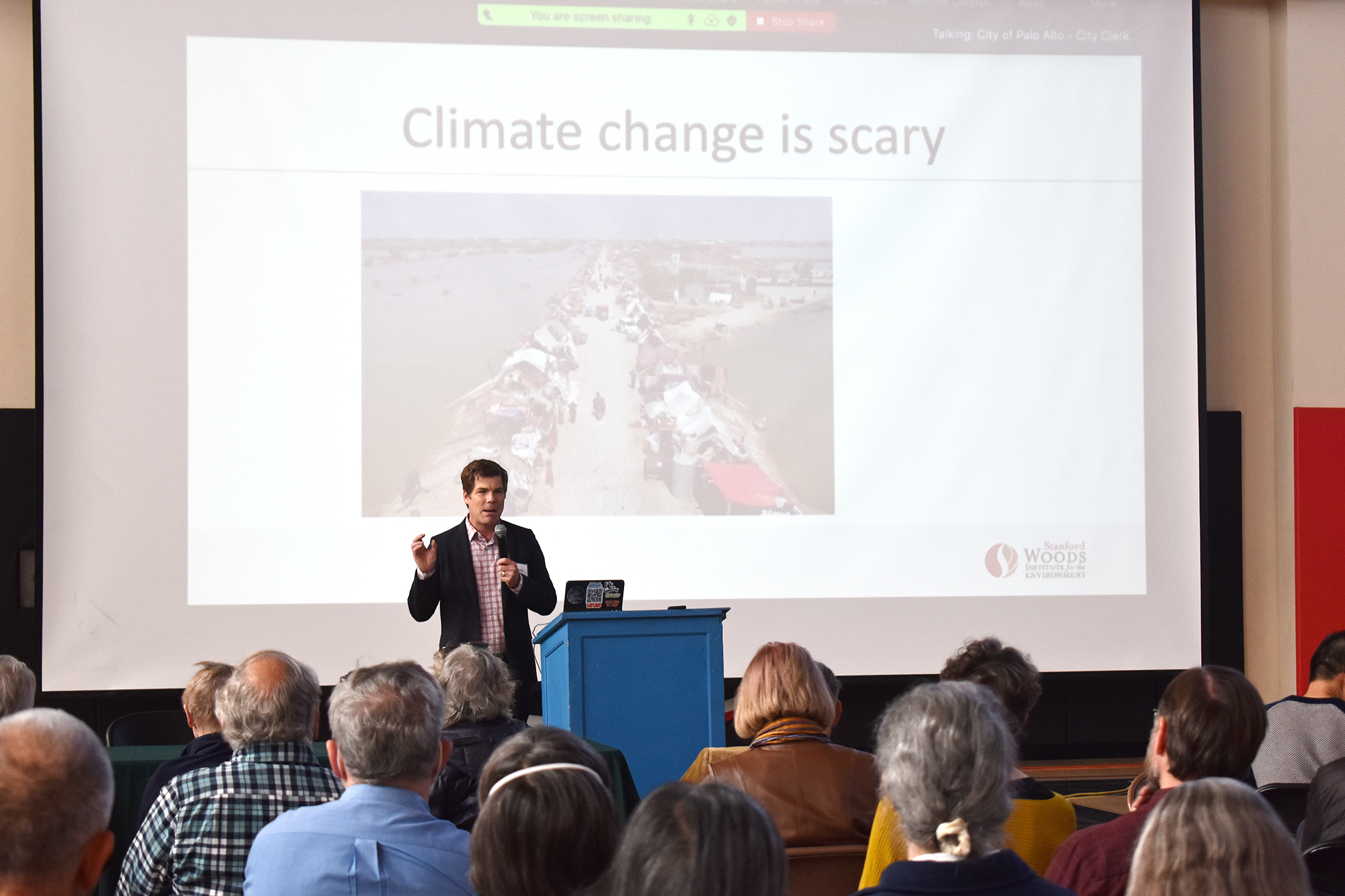

Comments
Registered user
Old Mountain View
on Nov 16, 2022 at 2:37 pm
Registered user
on Nov 16, 2022 at 2:37 pm
Hats off to the Gunn and Palo Alto HS students for organizing this!